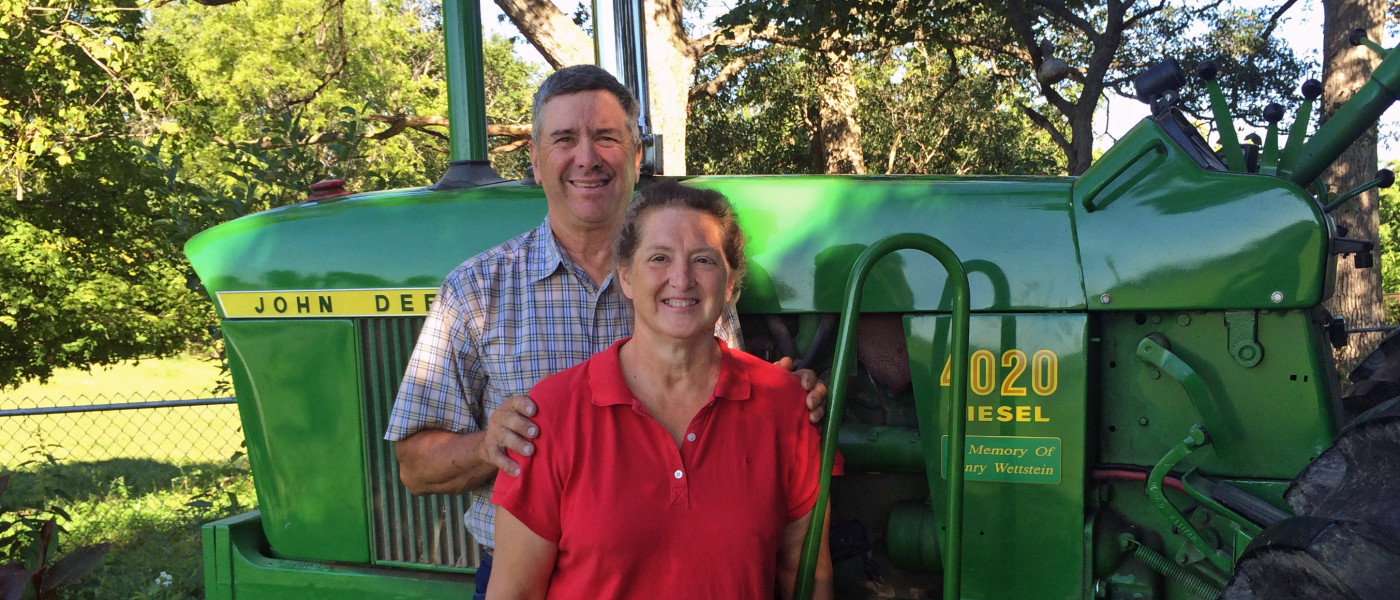Last year Farm Aid introduced you to the Wettsteins of Carlock, Illinois. Since they are small scale poultry producers, we decided to visit them again to talk about bird flu.
As the days lengthen, Denny and Emily Wettstein of Carlock, IL use all the daylight they can to bring their farm operation up to full production. The Wettsteins farm 300 acres and raise and sell organic beef, pork, poultry and eggs directly to a growing number of customers who value fresh, healthful food and who want to see their food dollar benefit local farmers. They also raise organic soybeans, corn and other grains and sell organic feed to other organic livestock and dairy farmers in the area.
Denny and Emily are also actively involved with The Land Connection, a central Illinois group supported by a Farm Aid grant which is working to create new markets for family farmers. Denny is on the steering committee of Farm Beginnings, a project of the Land Connection that works with young and prospective farmers.
“We enjoy everything we do on the farm,” said Denny. Last summer, Farm Aid visited the Wettstein farm during the Champaign to Chicago farm caravan that preceded the 20th Anniversary concert. With his John Deere tractor, Denny pulled two flatbed trailers full of other farmers and journalists who came on the caravan. They heard Denny explain his farming practices and innovations. They saw a thriving diversified family farm that makes 100 percent of its income from the farm. And they tasted barbecued homegrown organic hamburgers that (and this writer can attest) were like no other hamburgers they’d ever tasted.
After a winter hiatus, Denny is ramping up his production of pasture raised organic chickens. Between March and November, the Wettsteins raise between 1500 to 2000 free-range birds and market them directly to consumers at central IL farmers markets as well as once a month in markets well to the north in Chicago. Dennis built the mobile pens that house the chickens and moves them every other day to fresh pasture. The chickens get fresh, organic grass to eat and, in their wake, leave organic waste that enriches the soil.
As Denny places fifty new baby chicks in one of his home made pens and gets them ready for the fresh pasture, he knows that this growing season is different from all others. From the daily headlines and radio programs, Denny knows that the question of avian flu coming to North America is not “if” but “when.”
As a small-scale family farm poultry producer, Dennis is leery of the prospects of avian flu, but even more so of the government regulations that may follow. “The government is using the threat of avian flu to push through a series of policies that are going to create many hardships for family farmers,” said Denny. In some states, there is already talk of prohibiting free-range production as a precaution against the spread of avian flu as other countries have already done. In others, farmers are concerned about a national animal identification program promoted by the USDA that would, under certain scenarios, make it mandatory to identify all animals on one’s farm. “The big corporations and packing plants are using scare tactics to push for the NAIS (National Animal Identification System),” states Denny. “This system will be awfully hard on the small farmer, while the giant poultry plants will be largely left untouched. I’m concerned that NAIS will mean the disappearance of many small producers.”
“People buy my chicken because they know me and they value a high quality product. Raised outdoors, my birds are healthier and much less likely to contract avian flu than birds that are concentrated by the tens of thousands inside giant poultry factories.” One of the rules under the National Organic Program is that poultry and livestock must have access to the outdoors. “If the government bans outside production, then I can no longer raise my chickens organically – which could put me out of business.”
“Just about every small farmer I talk to is really afraid that the bird flu will be the death knell for small producers,” says Terrra Brockman, Executive Director of the Land Connection. “It is really distressing to be hearing that huge confinement operations are now being called hygienic and biosecure, while small family farms and pastured poultry are accused of being dangerous! Denny or any other small farmer will tell you that chickens raised outdoors on pasture and moved everyday are healthy birds that are not susceptible to bird flu or any other disease, and are the healthiest chickens that a person could possibly eat.”
As the threat of avian flu hovers on the minds of family poultry farmers across the country, like Denny Wettstein they continue to do what they do best: grow the best tasting, humanely-raised organic chicken available on the market. “Our customers know that the chicken they buy from us is the safest they can buy,” said Denny. “All the food-borne illnesses we have today, whether it’s Salmonella, E. Coli, mad cow disease and now avian flu, have all become serious public health problems because of the industrial factory farms that raise the bulk of the food in this country. Customers want safe food, and they know that family farmers are their best guarantee.”



